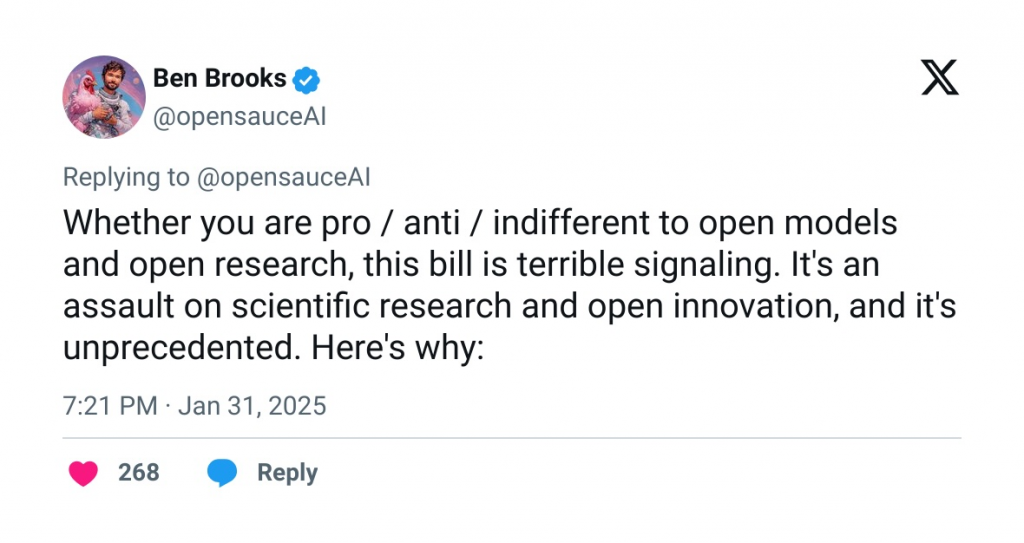A New Bill Aims to Block China’s AI Influence, and DeepSeek May Be Ground Zero
In a move that’s stirring up debate, U.S. Republican Senator Josh Hawley has introduced a bill that could change the global landscape of artificial intelligence (AI). On January 29, Hawley unveiled the “Decoupling America’s Artificial Intelligence Capabilities from China Act,” a proposal that would ban the import and export of AI technologies between the U.S. and China. While it doesn’t specifically mention DeepSeek, this tech company—and others like it—would be directly impacted if the bill passes.
Hawley’s motivation? A growing concern over intellectual property theft and the potential for China to exploit U.S. AI advancements for its own gain. The bill is targeting any U.S. nationals and companies working with Chinese entities on AI research and development. The penalties? A hefty fine of up to $1 million for individuals and $100 million for companies, alongside the potential for losing government contracts and benefits.
But is this bold move really a game-changer? Or is it simply political posturing, aimed at flexing muscle without much chance of success?
A Hardline Approach: Hawley’s Stance on China and AI
Senator Hawley is no stranger to taking hardline stances on China. Known for his critical views on Chinese trade practices, he has previously introduced legislation to impose tariffs on Chinese-made electric vehicles and voiced concerns over apps like TikTok, arguing that they pose national security risks by giving the Chinese government access to Americans’ personal data.
Now, Hawley is setting his sights on AI, citing the risk of Chinese companies taking advantage of U.S.-developed technologies. The introduction of his bill follows the debut of DeepSeek, an AI software that has sparked significant concern among tech investors and critics alike.
While the bill is clearly aimed at curbing Chinese influence in AI, there’s skepticism over whether it will ever make it through Congress. Despite the U.S. Senate’s Republican majority, many believe that the bill could be “dead on arrival” without broad bipartisan support. According to Aaron Brogan, a lawyer specializing in emerging tech regulations, much of what happens in Congress is about generating publicity and posturing—especially when a bill lacks co-sponsors who could help push it forward.
A Broad and Risky Proposal: Could It Stifle Innovation?
Even if Hawley’s bill garners some traction, it faces another significant challenge: its vague and sweeping scope. Critics, including Ben Brooks from Harvard’s Berkman Klein Center, point out that the bill casts an alarmingly wide net, banning anything that touches AI without distinguishing between different types of risk or capability.
Brooks warns that such a broad approach could effectively kill off open-source AI projects in the U.S., with developers unable to collaborate freely with Chinese counterparts. In a world where AI innovation thrives on global collaboration, this could create significant barriers to progress.

While hawkish voices in the U.S. government may argue that decoupling from China is essential to protect national interests, the consequences could be far-reaching. As Brooks explains, this bill could hurt smaller players in the AI field and potentially strengthen China’s global influence by driving the world toward even more reliance on Chinese tech.
The Economic and Political Fallout: A High-Stakes Gamble
The broader economic implications of such a bill could be enormous. As Brogan notes, decoupling the U.S. and China’s economies might seem like a necessary step for national security, but it would likely be expensive and disruptive for industries heavily invested in both markets. Companies like Tesla, for instance, have deep ties to China, and any sweeping restrictions could create massive challenges for them.
Even more concerning is the risk that this bill could spark an economic standoff, especially if tensions between the U.S. and China escalate further. According to some analysts, if a military conflict were to break out over Taiwan before the economies are fully decoupled, the effects could be devastating.
The Global Impact of DeepSeek: Privacy and Data Concerns
While Hawley’s bill faces an uncertain future in the U.S., the debate around China’s AI capabilities continues to unfold globally. On February 6, U.S. lawmakers are expected to propose a bill banning DeepSeek from government devices, while Texas Governor Greg Abbott has already issued a similar ban for state employees, citing concerns about data security and privacy.
The U.S. Navy has also joined the ranks, prohibiting the use of DeepSeek due to “ethical concerns” and potential security risks. And it’s not just the U.S.—Italy has already imposed an outright ban on DeepSeek, while other countries like Taiwan, Australia, and several European nations are scrutinizing its data practices.
Despite the U.S. pushing back against China’s AI capabilities, it seems likely that some form of limitation or regulation on Chinese tech will become a global trend. However, how far this movement will go—and whether it will succeed in halting China’s AI progress—remains to be seen.
Conclusion: A Longshot or a Turning Point?
Senator Hawley’s bill may be bold, but it’s far from a guaranteed success. While the intentions behind it are clear—securing U.S. technology from foreign exploitation—the broad scope, lack of bipartisan support, and potential economic fallout make it unlikely to pass in its current form.
That being said, the rising concerns about Chinese influence in AI are not going away. Whether through legislative efforts like Hawley’s or international restrictions on companies like DeepSeek, it’s clear that the world is grappling with how to deal with the rapid development of artificial intelligence and its potential consequences.
As global scrutiny of Chinese AI firms intensifies, we may be entering a new era of tech regulation—one where national security, privacy, and innovation are all in the balance. Time will tell if this is the beginning of a decisive decoupling or just another political spectacle.



